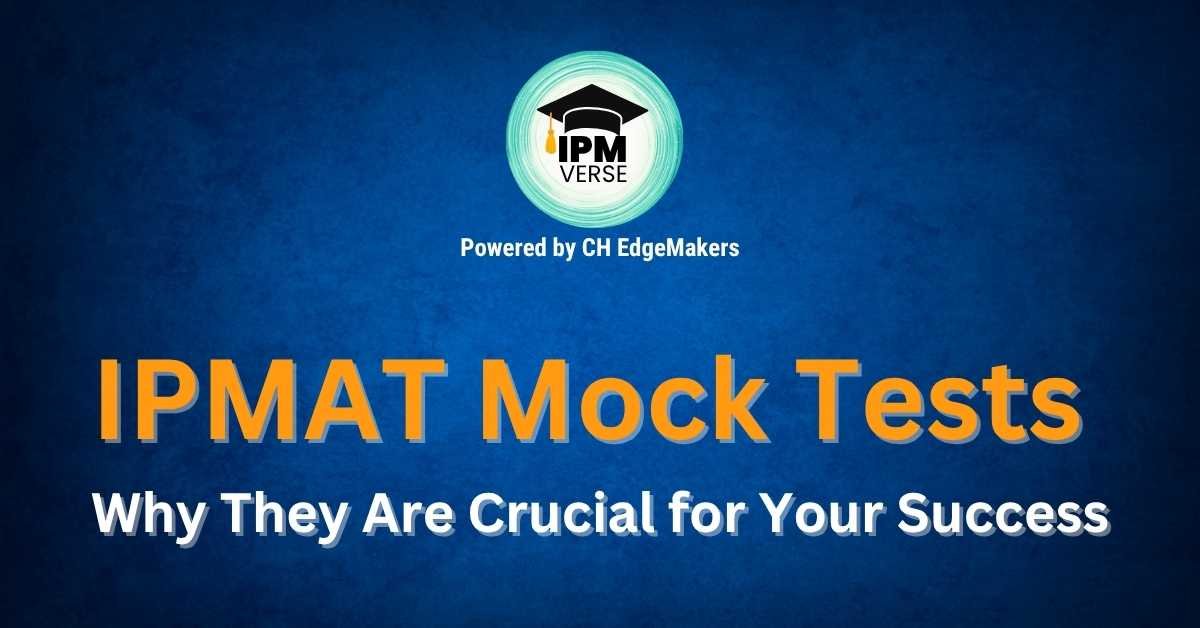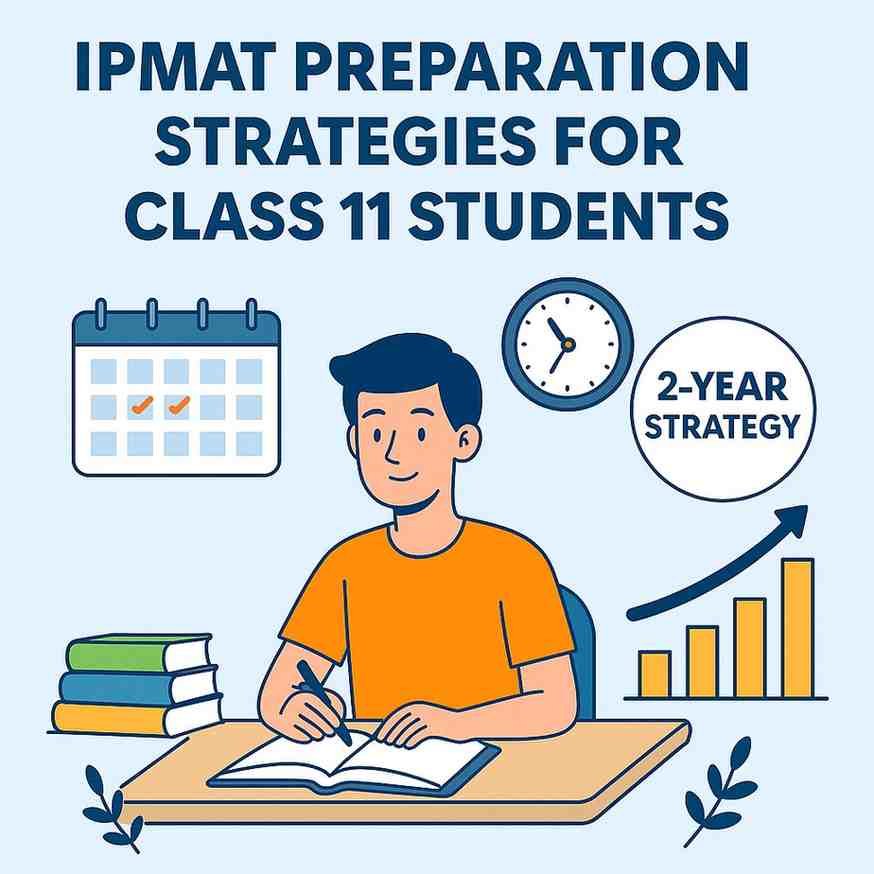Integrated Program in Management Aptitude Test (IPMAT) is among India’s highly competitive exams which gives the students a guaranteed admission in IIM Indore, IIM Rohtak, and the top performing colleges’ top performing five year Integrated Program in Management (IPM). As the test level is rigorous, the aspirants intending to sit for it must prepare for it in an organized and systematic manner. The one most underestimated but very important IPMAT success tip is mock tests.
Mock tests are not practice tests but simulations of real test conditions where students can boost their confidence level, time management, and even identify their weak point and strong areas. In this article, we will learn why IPMAT mock tests are a must for your success, how you should use them in your favor, and what are the most prevalent mistakes done by students while offering them.
1. Why Mock Tests Are Important for IPMAT
Mock tests are not just a way of verifying how much syllabus is covered. Mock tests have certain benefits, which are:
a) Familiarization with the Exam Pattern
IPMAT consists of Quantitative Ability (Short Answers and MCQs) and Verbal Ability tests. Pattern, question form, and difficulty level at some point might seem daunting to debutante candidates. Mock tests help candidates adjust to:
- Acclimatize test speed
- Acclimatize question pattern
- Optimal time management for each section in proper manner
b) Boost in Speed and Time Management
IPMAT is also amongst the bigger areas of finishing the test within the given time frame. Students are lagging in some sections, and that results in no answers and an average score being low . Mock tests introduces students to:
- Ordering first, simple questions first and solving them first before anything else
- Sectional time management
- Forming strategies to improve accuracy without investing much time in one question
c) Weak Spots and Strengths
Mock tests uncover weak points that need to be refined. Ongoing performance monitoring enables students:
- To determine weak points
- To pinpoint frequent errors in problem solving
- To retake isolated sections with additional effort
In the absence of mock tests, students will overestimate readiness and are unable to correct weak points.
2. How Mock Tests Improve Accuracy and Confidence
Accuracy is valued in IPMAT. Wrong choice is marked wrong so that at some point or another it will negatively impact the overall score. Mock tests steer clear of:
a) Mistakes
Students lose marks by committing impatient errors, i.e., reading questions wrong, numerical errors, or incorrect options filled in a hurry. Mock test practice is practiced many times so students become used to developing the following habits:
- Careful reading of questions
- Rehearsing answers before submission
b) Confidence Building on Test Day
Mock solving of tests mimics real test conditions, fear free and tension free.
Scenario similar to a test, where the students become used to solving full length papers, makes them confident enough to look for solutions within time and thus excel in skill.
c) Enhanced Decision Making and Logical Reasoning
Mock testing habituates the students to:
- Fast work and solution finding
- Identifying the optimal way to crack a question
- Selecting questions to attempt and when to abandon a question
3. How to Use IPMAT Mock Tests Most Effectively
Practice mock tests, but how you prepare for and learn from them matters the most. Take a look at the following step by step guide on using mock tests and how to get the maximum IPMAT score:
a) Prepare Early and Take Tests Constantly
- Take at least 3-4 months of mock tests before the real test.
- Provide one weekly mock test and practice 2-3 tests a week in the second half of the exam.
b) Create Real Exam Environment
- Take mock tests in a quiet room so that one becomes comfortable with the exam day environment.
- Practice within real time constraints of the test (e.g., 90 minutes for IPMAT at IIM Indore ).
- Stay focused due to absence of breaks or phones.
c) Rehearse Your Performance in Detail
It isn’t a case of taking an exam; learning is in the evaluation. Reflect after each practice test on:
- Questions where you spent too much time?
- Where did you make mistakes? Brainless mistakes or thinking mistakes?
- Where do you need to put more effort?
Maintain a mistake log where errors are recorded and repetition is prevented.
d) Score Based Mock Test Strategy Formulation
- Every student possesses his/her strengths and weaknesses. Mock tests help in improving strategy.
- Identify in which section to attempt first
- Decide how to best manage time per section
- Experiment with different approaches (e.g., first attempt Verbal Ability, followed by Quantitative Ability)
4. Blunders of the Student Practicing using Mock Tests
Each student takes mock tests but is unable to get the best out of them based on the following mistakes:
a) Not Passing Through Wrong Options
Certain of the students try to try mock tests but fail to review their mistakes in the correct way. Absence of force of learning from previous errors, proceeding further to the next test will ever be counter productive.
b) Misjudgment of Time Management
It is not common to sit for a full mock test with no time constraints. Practice under timed conditions at each level to develop exam day stamina.
c) Avoiding Difficulty Questions
Students seldom skip challenging questions while practicing under the assumption of improvement in some way by passing time. Practice and master such questions at the first stage to close loopholes even before sitting for the exam.
d) Excess Dependence on Mock Tests with Conceptual Lack of Clarity
Mock tests overestimate capacity but without any alternative than learning concepts . Except for those candidates who are not capable of dealing with simple concepts in Quantitative Ability or Verbal Ability, they will be compelled to learn concepts again and do the basics.
5. Choosing the Best Mock Tests for IPMAT
All mock tests are not the same. While selecting mock tests to practice, remember the following:
- Hot Coaching Centers: Attempt CH EdgeMakers mock tests as they have been found to offer good practice questions.
- Old Year Papers: Attempt IPMAT old year papers to get used to the level of the examination.
- Adaptive Learning Platforms: Web based platforms with artificial intelligence backed performance analysis can possibly be used to track progress.
6. Last Words: Why Mock Tests Bring IPMAT Success
Mock tests are the bridge between practice and performance. Mock tests benefit students with:
- Time management
- Training in speed and accuracy
- Identification of weak areas and plugging gaps
- Confidence on the day of the exam
Students who work diligently and take mock tests will undoubtedly be of the highest caliber in IPMAT and be winners of the war to get into an IIM.
So, let’s begin solving mock tests today, learn your weaknesses, and iron out your game strategy for achieving IPMAT success!
Best of Luck!
IPMAT 2027 full beginner guide: syllabus, pattern, eligibility & Best
IPMAT 2027 Beginner Guide IPMAT 2027 Beginner Guide : Hey If you are reading this and are studying in class 9,…
IPMAT vs JIPMAT vs SET – Which Entrance Exam Is
IPMAT vs JIPMAT vs SET – Which Entrance Exam Is Right for You? Are you the one who is studying…
Can Commerce, Arts, or Science Students Crack IPMAT?
Can Commerce, Arts, or Science Students Crack IPMAT? You must have heard a lot of time people saying that the students…
Top MBA Entrance Exams in India 2026: Key Dates &
Top MBA entrance exams in India : An MBA is not a degree it is a roadmap to life. It…
IPMAT Preparation Strategies for Class 11 Students – 2 Year
IPMAT is an extremely competitive entrance examination held by the Indian Institutes of Management (IIMs) for the five year integrated…
Top Career Options After IPMAT: Why IIM Indore is Worth
Integrated Program in Management Aptitude Test (IPMAT) is the gateway to one of India’s most prestigious management programs—the five-year Integrated…









